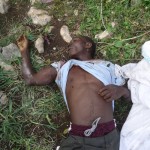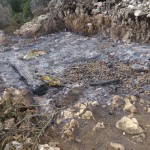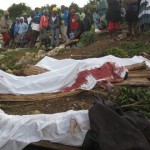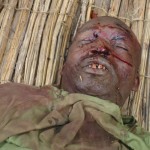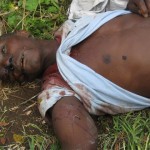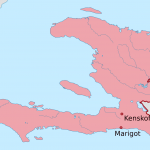by Kim Ives, Haiti Liberté
Haitian police have killed four people and destroyed seven homes in an attempt to clear peasants from a remote mountain-top park where they have lived and farmed for the past 70 years. The bloody confrontation, which occurred (July 23, 2012) exactly 25 years to the day after an infamous 1987 peasant massacre near the northwestern town of Jean-Rabel, has incensed the Southeast Department’s population and redoubled charges that the President Michel Martelly’s government is resurrecting the repressive tactics of the Duvalierist and neo-Duvalierist dictatorships which ruled and scarred Haiti over two decades ago.
The incident was first reported and photographed by Claudy Bélizaire of the Jacmel-based Reference Institute for Journalism and Communication (RIJN). His photographs of bloody corpses and burned houses in Galette Seche/Seguin, a remote locality near the peaks of some of Haiti’s highest mountains, have gone viral on the Internet, Twitter and Facebook. Meanwhile, the mainstream media has largely ignored the story to date.
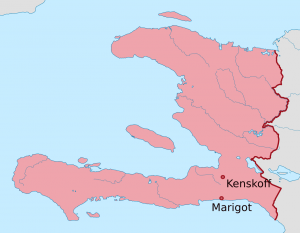 “A squad composed of 36 officers of the Departmental Unit of Law Enforcement (UDMO), directed by the Departmental Director of the HNP [Haitian National Police], accompanied by the Divisional Delegate of South-East, the Government Commissioner and a Justice of the Peace, came to Seguin [in the Marigot commune] specifically to the La Visite Park, aboard six vehicles and an ambulance of the Haitian Red Cross to launch an operation aimed at evicting 140 families, who have been illegally occupying [since 1942!] a part of the Park,” the RIJN reported.
“A squad composed of 36 officers of the Departmental Unit of Law Enforcement (UDMO), directed by the Departmental Director of the HNP [Haitian National Police], accompanied by the Divisional Delegate of South-East, the Government Commissioner and a Justice of the Peace, came to Seguin [in the Marigot commune] specifically to the La Visite Park, aboard six vehicles and an ambulance of the Haitian Red Cross to launch an operation aimed at evicting 140 families, who have been illegally occupying [since 1942!] a part of the Park,” the RIJN reported.
“Furious at this armed, muscular intervention, the local people confronted the police and threw stones. According to witnesses, the operation lasted two hours. Many shot were fired against the protesters and … five policemen [were] injured,” according to the RIJN. “The bodies of four victims were found and identified [Désir Enoz – 32 years, Nicolas David – 28 years, Robinson Volcin – 22 years and Désir Aleis – 18], four children are reported missing, three houses were completely destroyed by fire and four others ransacked, and three oxen were killed. Yet the day after this tragic incident, Ovilma Sagesse, the Chief Constable of the South-East, claimed these statements were false, saying that only five policemen were injured by the park’s occupiers. ‘Given the aggressiveness of these individuals, we had to suspend the operation to avoid having victims.’ The victims’ bodies at the La Visite Park, however, attest to the contrary.”
Reached by telephone, Claudy Bélizaire told Haïti Liberté that the situation in the area remains very tense, and the local people very angry. “The population has burned about 100 hectares of pine forest in response to the authorities’ intervention,” Bélizaire told Haïti Liberté. That figure comes from Frantz Pierre-Louis, secretary general of the central government’s southeast office.
The agronomist Arcène Bastien, the Environment Ministry’s South East departmental director, in his remarks to the Nouvelliste, denied that the police committed any violence against the peasants living in the La Visite Park, saying that “30 policemen who accompanied the delegation of Emergency Preparedness had to backtrack faced with the people’s wrath.” He also tried to raise the specter of a conspiracy, saying to the newspaper that “troublemakers had infiltrated the population and whipped them up against the delegation.”
It seems, nevertheless, that those who protested against the eviction of the 140 families and the victims who were killed by bullets were not armed in any way. “They did not have any weapons,” Belizaire told us. “They only threw stones.”
Recently, Senator Moïse Jean-Charles has charged that the government and big landowners in Haiti’s north have also begun expropriating peasants from their land. After the fall of the Duvalier dictatorship in 1986, peasants reclaimed many lands which had been stolen from them and from the state over decades by the grandons, as Haiti’s big landowners are called.
“Today, with Martelly’s accession to power, all the big shots, the grandons who seized land around Milot, have assembled around Martelly,” he recently told Haïti Liberté in a long interview (see Haïti Liberté, Vol. 5, No. 51, Jul. 4, 2012). In the 1980s, the senator was the leader of the Milot Peasants Movement (MPM). “They have power in their hands, and they have begun to attack us.”
On July 23, 1987, the grandons near Jean-Rabel massacred with guns and machetes at least 139 peasants affiliated with Tèt Kole Tipeyizan Ayisyen (the Heads Together of Haitian Small Peasants). Grandon Nikol Poitevien famously went on Haitian television a few days later to claim that “we killed 1042 Communists.’
In a long declaration on the anniversary, Tèt Kole decried that “the criminals still are walking around our society freely, swimming in state corruption without any anxiety” and denounced the government of President Martelly and his Prime Minister Laurent Lamothe as undertaking Haiti’s “liquidation.”
In Le Nouvelliste, the commentator Roberson Alphonse characterized the killings in Seguin as “a fiasco” and “a shame” but argued that “fundamentally, the efforts to restore protected areas and to rehabilitate shrinking woodlands are necessary “and even” indispensable, given the park’s biodiversity, endangered for years by the row crops of the occupants and the unregulated cutting of trees for domestic use.”
In his report, Bélizaire said: “After several hours of discussions with policemen stationed in the area, community leaders and families of victims and grieving neighbors, a Committee of four members was formed…, an intermediary was designated by the population to discuss with the authorities such as: Nadège Excellus, representative of women victims, Estinvil Sainvilus (ASEC), Jean Dais, community leader, and Pierre Félix, a member of an area organization. The negotiations are not over. Note that since this serious incident, no state official has come to Seguin, where barricades have been erected by the people, in protest. The only item known about this negotiation was an envelope of 50,000 gourdes [about $ 1,250] promised to each family (50% before departure, 50% after). However, the offer, which proposes no place of relocation, was rejected by the families involved, who believe that this amount is insufficient to enable them to purchase land, find a patch of fertile agricultural land and relocate.”
The Parc La Visite is one of Haiti’s three national parks and has one of Haiti’s last remaining pine forests, in a country that is 98% deforested. It has suffered from unauthorized logging and clearing over the last decades, which has affected the watersheds for the cities of Port-au-Prince and Jacmel.
However, the violence in uprooting the families in the park is similar to the uprooting of families in the Pétionville slum of Jalousie, a move also being defended as an environmental imperative.
“We can easily understand the need to defend Haiti’s environment but any relocation must be done equitably and with adequate compensation and planning so that those displaced can find new homes and not be left homeless,” Ronald Joseph, a Jalousie resident, told Haïti Liberté. Many of the shanty-town’s residents complain that wealthy residents also living on the mountain Morne Calvaire, on whose flank Jalousie sits, are not being targeted for eviction.
The situation in Seguin has become so tense that the United Nation military occupation force has felt compelled to make a statement distancing itself from the Martelly government’s actions: “The United Nations Mission for Stabilization in Haiti (MINUSTAH) is concerned by reports of the deaths of at least four Haitians and several injured, in circumstances not yet clear, during an operation of forced evictions conducted by police officers,” the note says. “A multidisciplinary team of the United Nations was deployed in the field to collect information to help establish the facts. MINUSTAH recalls that forced eviction without providing alternative adequate housing is contrary to international human rights, including the International Covenant on Economic, Social and Cultural Rights.”

